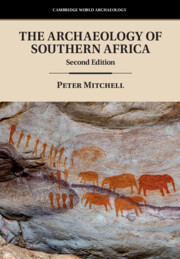Book contents
- Frontmatter
- Contents
- List of Figures
- List of Tables
- Acknowledgments
- 1 Introduction
- 2 Frameworks
- 3 Contexts
- 4 Origins
- 5 A Cognitive Revolution
- 6 Hunter-Gatherers of the Late Pleistocene
- 7 Archaeologies of the Pleistocene/Holocene Transition
- 8 Hunting, Gathering, Intensifying: Forager Histories in the Holocene before 2000bp
- 9 Taking Stock: Herders and Hunter-Gatherers
- 10 Farmers and Foragers: the First Millennium
- 11 Forming States: the Zimbabwe Culture and its Neighbours
- 12 Recent Farmers and Hunter-Gatherers in Southernmost Africa
- 13 Colonisation, Conquest, Resistance
- 14 Perspectives and Prospects
- Glossary
- References
- Index
2 - Frameworks
Published online by Cambridge University Press: 15 May 2024
- Frontmatter
- Contents
- List of Figures
- List of Tables
- Acknowledgments
- 1 Introduction
- 2 Frameworks
- 3 Contexts
- 4 Origins
- 5 A Cognitive Revolution
- 6 Hunter-Gatherers of the Late Pleistocene
- 7 Archaeologies of the Pleistocene/Holocene Transition
- 8 Hunting, Gathering, Intensifying: Forager Histories in the Holocene before 2000bp
- 9 Taking Stock: Herders and Hunter-Gatherers
- 10 Farmers and Foragers: the First Millennium
- 11 Forming States: the Zimbabwe Culture and its Neighbours
- 12 Recent Farmers and Hunter-Gatherers in Southernmost Africa
- 13 Colonisation, Conquest, Resistance
- 14 Perspectives and Prospects
- Glossary
- References
- Index
Summary
This chapter sets out some of the key frameworks within which southern African archaeology operates. It first establishes the boundaries of ‘southern Africa’ for the purposes of this book and then examines the region’s physical geography. The climate and topography described frame southern Africa’s present-day ecology, which is discussed using the biome divisions of Mucina and Rutherford (2006). The chapter then considers how environmental change affected southern Africa during the Quaternary (using the well-known Marine Isotope Stage (MIS) system), the data that archaeologists and others use to reconstruct past environments, and the principal climatic mechanisms at work in the region. It concludes by outlining and assessing the major chronometric and other dating methods employed to build the chronological framework of southern Africa’s past.
Keywords
- Type
- Chapter
- Information
- The Archaeology of Southern Africa , pp. 11 - 32Publisher: Cambridge University PressPrint publication year: 2024

